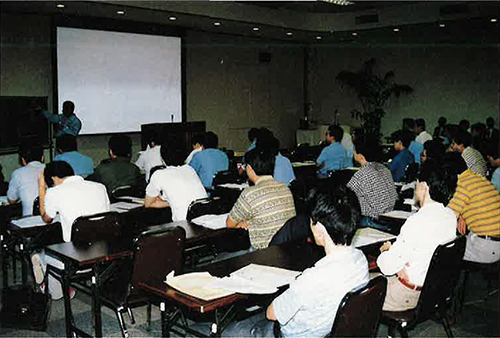100 Stories1974 Think Tank - Asahi Research Center
Asahi Kasei was supported by an affiliated company acting as a source of information during the economic boom. In an era when it was difficult to obtain a variety of information easily via the Internet, the Asahi Research Center (ARC), was responsible for researching and obtaining information.
At that time, the first oil crisis made it necessary to accurately collect and analyze internal and external information on all kinds of issues surrounding companies. ARC was established in 1974 as a powerful research organization to take on this task.
This was due to an idea that was typical of Kagayaki Miyazaki, in which he stated, “If you create a research department within a company, budgets are immediately cut when the recession hits, and you are treated as an afterthought. However, if we only conduct research that is directly related to our work, it may be fine in the short term, but in the long run, we may lose sight of social and historical trends, and the company may end up going in a very wrong direction.”
ARC conducted “surveys, analysis, and research on politics, economics, diplomacy, culture, industry, corporations, chemistry, and natural resources,” as well as “surveys, analysis, and research on technological standards and trends in all industrial fields, and studies of the commercialization and systemization of technology.” It was truly an organization that investigated and analyzed all the issues surrounding companies.
Miyazaki was also a member of the Second Temporary Administrative Inquiry Committee (Rincho II), which was known for the privatization of three public corporations (Japan National Railways, Nippon Telegraph and Telephone Public Corporation, and Japan Monopoly Corporation), and was supported by Yoichi Sando and Yoshio Suzuki from ARC.
Suzuki was a longtime advocate for administrative and regulatory reform in Japan, having served as a staff member of Rincho II and then as chairman of the board of directors of the ARC. He had the following to say about the regulatory reform at that time.
“I was deeply moved by the change in the substance of regulatory reform. Until then, deregulation was nothing more than the reorganization of ‘regulations that are no longer in use.’ Now the emphasis is on eliminating regulations that are actually having a significant impact on economic activity and people's lives.”
Among these, Suzuki made a particular effort to reform the healthcare system. For example, it was as a result of this reform that it became possible to sell pharmaceuticals at general retail stores, a practice that is now commonplace. Also, a certain amount of resolution was achieved with regard to mixed medical treatment. Before the deregulation, mixed medical treatments were not covered by insurance.
ARC, which has produced individuals like Suzuki who have also been active in government, has recently attracted attention for its analysis of the application and development of cellulose nanofibers (CNF), a new material derived from wood. Japan is a world leader in this field, ranking second in the world with 640 CNF patents filed in the five years since 2015. Senior Fellow Haruo Matsumura, who conducted the study, said, “Most of the applications filed in China, which ranks first, are domestic only. If we limit ourselves to patents that are valid worldwide, the vast number of Japanese applications stands out,” he said, referring to Japan's dominance in this field.
Asahi Kasei is also focusing on CNF as a sustainable material, and it is expected to grow in the future. Matsumura added to the results of Rincho II that, “The key to growth is to develop highly functional products that cannot be imitated by foreign companies and to increase the recognition of CNF.”
ARC continues to maintain its presence even as times change and the Internet and other sources of information become more readily available. More than 40 years have passed since ARC was established as a think tank of Asahi Kasei Corporation. While many of Asahi Kasei's affiliated companies have changed the prefix in their names from Asahi to Asahi Kasei, the ARC has kept its original name, leaving it as the Asahi Research Center.
Asahi Research Center HP
https://arc.asahi-kasei.co.jp/en/


